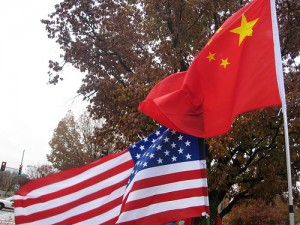There’s a lot of confusion over this topic, so let’s break down some of the factors.
The principle is that you need someone to buy whatever it is you want to produce. That means it has to be priced reasonably, and that you either have to have foreign or domestic consumers.
It’s often noted that before the British conquest of India, India had more textile factories than Britain. Britain destroyed them. Why? Because they wanted them to buy textiles made in Britain. Before that, the most important government action to create industry in Britain is that they forbid the export of wool to the Low Countries. Why? Because Flemish weavers were way better than British ones. But it doesn’t matter how good your weavers are if they don’t have wool. So the Brits kept the wool at home and pretty soon they had a textile industry. When cotton and mechanized looms came along they wound up selling the world. After all, there wasn’t any competition from India!
Imperialism, trade policy and technological advances for the Industrial Revolution win.
So if you’re a country which wants domestic production you need customers. Demand. It can be domestic or international. Now in traditional industrialization you need foreign customers usually, because your country is poor before industrializing. Almost everyone did it this way except Russia. America was a partial exception, having strong domestic markets and legacy tech inherited from British North America, but only a partial one: they sold a lot to Britain and Europe in the early years.
You also need the technology, and you get a lot of that from overseas unless you were Britain. This is true of pretty much everyone, including the US (which got huge investments from Britain), Japan (Britain first time, US for reindustrialization after WWII), South Korea (US), Taiwan (US), and China (US). Germany might be considered a partial exception in the 19th century, their industrialization story is startling and impressive (See “Cities and Civilization” by Peter Hall.)
But let’s say you’ve already industrialized once, and then partially re-industrialized. You have the remnants of a skilled workforce and you have good universities and technical institutes and a literate workforce. (Pushing it here, half of Americans are essentially illiterate.)
You’ve also got a fairly rich population and decent domestic demand, in global terms. In other words, there’s domestic demand sufficient to support more production than you’re doing. (How do you know? Well, all those imports indicate demand, don’t they?)
The problem is that foreign production is cheaper and quite likely better. (Remember those Flemish weavers.)
Now the first way to do it takes its cue from the Brits and wool. If you produce a lot of resources suitable for production, why are you selling them in the raw state?
There’s a few stages of this. If you’ve got oil, say, you could refine it in country before sending it overseas. In Canada it used to be illegal to ship raw fish overseas, but after NAFTA it got sent to the US to be stuck in tins or smoked or whatever. You shouldn’t be sending raw logs. You should refine bauxite into aluminum yourself. Copper into wires. Etc…
This only works if the current producers can’t just buy from someone else, but there are certainly still cases where this is true. (We’re about to experience very severe copper shortages, silver is already in shortage, and China has been using its control over rare earths like this.)
Tariffs come in when you want to make domestic production cheaper than overseas. If you’re just starting in an industry, it’s going to be. You can use tariffs (the US strategy during the 19th cnetury), you can force your currency lower than its market value (this is what China did) or you can use subsidies. Tariffs are under international agreement, essentially illegal, but Trump has made that a dead letter, so they’re possible again.
Tariffs are only useful, however, if you’re actually going to be increasing production. They do nothing if you aren’t. (Trump, pay attention.)
Now let’s talk about demand. If you need more demand for goods you need to increase the amount of money people can spend on whatever it is. There’s a number of ways to do that.
First is tax policy: tax poor and middle class people less and rich people more. Give them money, taken from the rich. Poor and middle class people spend most of their money on goods and services. Rich people, given more money, drive up asset prices. Note that this means income taxes. Get rid of general VAT taxes, you don’t want to tax consumption or in anything you want more demand create an exemption. You can also remove taxes on whatever it is you want people to buy.
Change other types of taxes to discourage short term trading, buying in secondary markets and future markets and encourage people with more money than they need to invest in production. High capital gains taxes on short term investments, for example. Tax rich people’s income highly, and send that to poor people or use it directly for investment thru the government. Tax corporation highly so they are encouraged to retain earnings and invest them. Get rid of stock buybacks, just make them illegal, like they were for much of the 20th century.
Second are any policies which drive up wages for the bottom 80% of the population generally.
Third are subsidies. Subsidize the cost of buying or manufacturing whatever it is. Europe, China and the US have all used this with electric vehicles.
Fourth are general market policies: you need competitive markets with few barriers to entry. You must make oligopolies and monopolies illegal and easy to break up or you must tightly regulate prices in monopolies. In general you don’t want any business to have pricing power, because if you give regular people money and business just jack up prices, demand doesn’t increase.
Fifth is breaking supply side bottlenecks. After the oil crises central bankers spent a lot of time deliberately putting downward pressure on wages because wage increases led to using more oil, all marginal oil increases had to come from OPEC and that meant inflation. So instead they pumped up asset prices like houses and stocks. If there’s something needed for production, you need to find a way to get enough for reasonable prices. Copper, coal, oil, silicon, rate earths, uranium… whatever. This may mean domestic production, it may mean trade deals, though domestic is better if feasible.
Sixth is that you have to reduce cost structures. Real estate, rent, interest rates, medical prices, and so on.These are costs: they make production more expensive and they soak up demand from regular people. If landlords can increase prices freely then, again, they’ll just take up any extra money that regular people get which would otherwise go to buying all those new products.
Seventh is making currency levels dependent on trade and not on financial flows. You want your currency low if you’re importing more than exporting, and high if you’re exporting more than importing BUT if you export a lot of resources, you need to find a way to reduce currency rates below what they’d normally be if you want manufacturing to increase. Doing all this means taming financial markets and making the central bank do what is necessary, which it often doesn’t want to, since it’s usually run by ex-bankers and traders.
Eighth is managing trade deals. It’s a lot easier to get a big enough market if you make a deal with another county or countries. “You produce X and we won’t. We’ll produce Y and you won’t, thus X and Y both have much larger markets. And we freeze other countries out of our market for these goods.” General free trade is usually stupid, managed free trade like this is smart.
Ninth is making your banks lend to producers at reasonable rates rather than lending to people whose actions will drive up asset prices instead.
This is a high level overview. Each point could support it’s own article, heck, it’s own book and I haven’t even hit all the high points.
But the point is that there’s a lot involved. Real policy is when a government tries to do something from all angles, not just one. You don’t just put on subsidies and hope for the best. You don’t just slap on tariffs and think “surely someone will start producing”. You have to actually use as many levers as possible to make it possible to produce: demand, supply, credit, market structure, smashing barriers to entry, avoiding pricing power and so on.
That doesn’t mean it can’t be done, that’s means you have to make it your main priority, the way it was for China for decades or for Japan for decades or for South Korea for decades. It doesn’t happen by accident, or if you only half-ass it. In fact half-assing it is likely to produce no noticeable results at all.
If Western countries want to reindustrialize, they can. But only if they decide they’ll do whatever it takes. Decline is baked in, resurgence takes effort.
This site is only viable due to reader donations. If you value it and can, please subscribe or donate.





